Transform Your Outdoor Space with Landscape Gardening in Forest Hill

Landscape gardening in Forest Hill offers a unique opportunity to enhance the natural beauty of your outdoor space. Whether you have a sprawling backyard or a compact urban garden, professional landscape gardening services can transform your area into a stunning oasis. With a focus on blending aesthetics with functionality, landscape gardening incorporates a variety of elements such as plants, hardscaping, lighting, and water features to create a harmonious environment.
Forest Hill's diverse climate and soil conditions provide a rich canvas for gardeners and landscapers to work with. From lush, green lawns to colorful flower beds and serene water gardens, the possibilities are endless. By understanding the local environment and utilizing sustainable practices, landscape gardening not only beautifies your property but also contributes to the ecosystem.
Choosing the right landscape design can significantly impact the value and enjoyment of your home. A well-designed garden offers a peaceful retreat, an inviting space for entertaining guests, and a personalized extension of your living area. Whether you're aiming for a modern minimalist look or a classic, traditional garden, landscape gardening services in Forest Hill can tailor a design that suits your preferences and lifestyle.
Benefits of Landscape Gardening in Forest Hill
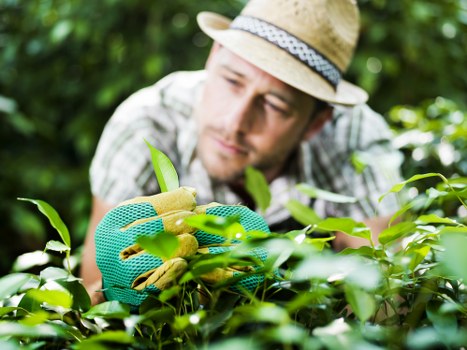
Engaging in landscape gardening in Forest Hill comes with numerous benefits that extend beyond mere aesthetics. Here are some key advantages:
- Enhanced Curb Appeal: A beautifully landscaped garden boosts the visual appeal of your property, making it more attractive to visitors and potential buyers.
- Increased Property Value: Well-maintained gardens can significantly increase the market value of your home, offering a great return on investment.
- Environmental Benefits: Plants and trees help improve air quality, reduce noise pollution, and provide shade, contributing to a healthier living environment.
- Personal Well-being: Spending time in a well-designed garden can reduce stress, improve mood, and promote overall well-being.
- Sustainable Living: Incorporating native plants and sustainable practices in your garden supports local biodiversity and conserves resources.
By leveraging these benefits, landscape gardening in Forest Hill not only enhances your immediate surroundings but also fosters a sustainable and enjoyable living space for years to come.
Moreover, a thoughtfully designed garden can serve multiple purposes, such as providing a safe play area for children, a serene spot for meditation, or a vibrant space for social gatherings. The versatility of landscape gardening makes it an invaluable addition to any property.
Planning Your Landscape Garden
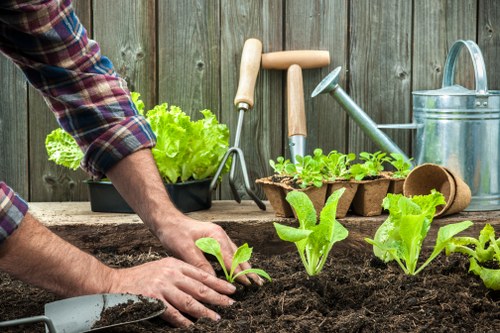
Embarking on a landscape gardening project in Forest Hill requires careful planning and consideration. Here are the essential steps to ensure a successful outcome:
1. Assess Your Space
Begin by evaluating the size, shape, and existing features of your outdoor area. Take note of sunlight exposure, soil quality, drainage patterns, and any existing structures or plants. This assessment will help you determine what is feasible and identify any potential challenges.
2. Define Your Goals
Consider what you want to achieve with your garden. Are you looking to create a space for relaxation, entertainment, or growing your own vegetables? Defining your goals will guide the design process and ensure that the final result aligns with your needs.
3. Choose a Style
Select a landscape style that complements your home and personal taste. Popular styles include contemporary, cottage, tropical, and native gardens. Each style has its own set of characteristics, plant selections, and design elements.
4. Select Plants
Choose plants that thrive in Forest Hill's climate and soil conditions. Incorporate a mix of evergreen and deciduous plants, flowers, shrubs, and trees to ensure year-round interest. Additionally, consider planting native species to support local wildlife and reduce maintenance efforts.
5. Incorporate Hardscaping
Hardscaping elements such as pathways, patios, decks, and retaining walls add structure and functionality to your garden. These features not only enhance the aesthetic appeal but also provide practical areas for activities and movement within the garden.
6. Plan for Lighting
Outdoor lighting can extend the usability of your garden into the evening hours, highlighting key features and ensuring safety. Consider a combination of ambient, task, and accent lighting to create a balanced and inviting atmosphere.
Seamless Integration of Elements
Integrating all these elements cohesively is crucial for achieving a harmonious landscape. Working with a professional landscape gardener in Forest Hill can help you navigate these choices and create a design that seamlessly blends all components.
Proper planning lays the foundation for a garden that not only looks beautiful but also functions effectively for your lifestyle.
Choosing the Right Plants for Forest Hill

Selecting the appropriate plants is a cornerstone of successful landscape gardening in Forest Hill. The region's climate, characterized by mild winters and warm summers, supports a wide variety of plant species. Here are some recommendations:
Native Plants
Native plants are well-adapted to the local environment, requiring less water and maintenance. They also provide essential habitat for local wildlife. Examples include:
- Eucalyptus – Known for their resilience and fragrant foliage.
- Bottlebrush – Vibrant flowers that attract pollinators.
- Grevillea – Diverse varieties offering colorful blooms and interesting foliage.
Flowering Plants
Incorporate a mix of annuals and perennials to ensure continuous blooms throughout the seasons. Popular choices include:
- Roses: Timeless beauties that add elegance.
- Lavender: Fragrant and attracts beneficial insects.
- Geraniums: Versatile and easy to maintain.
Andalusia Plants
For a touch of the exotic, consider Andalusian plants that thrive in Forest Hill's conditions:
- Ornamental grasses – Add texture and movement.
- Succulents: Low-water plants that offer unique shapes.
- Camellias: Evergreen shrubs with stunning flowers.
Seasonal Considerations
Plan your garden to include plants that bloom in different seasons, ensuring a vibrant and dynamic landscape year-round. Combining various species with different flowering times will keep your garden attractive and lively throughout the year.
Additionally, consider the growth habits and sizes of plants to maintain balance and prevent overcrowding. Regular pruning and maintenance will help keep your garden healthy and aesthetically pleasing.
Hardscaping Essentials for Forest Hill Gardens

Hardscaping plays a vital role in landscape gardening by providing structure and functionality. In Forest Hill, integrating hardscape elements can enhance the overall design and usability of your garden. Key hardscaping features include:
Pathways and Walkways
Creating defined pathways guides visitors through your garden and connects different areas. Materials such as gravel, pavers, flagstones, and concrete offer various aesthetic and functional options. Pathways also help in managing foot traffic and preserving plant beds.
Patios and Decks
Outdoor living spaces like patios and decks provide areas for relaxation and entertainment. They serve as extensions of your indoor living areas, offering a place to dine, lounge, or gather with family and friends. Choosing the right materials and design ensures these spaces complement your garden's overall theme.
Water Features
Incorporating water elements such as ponds, fountains, or waterfalls adds a soothing ambiance to your garden. Water features attract wildlife, create a calming atmosphere, and serve as focal points in the landscape design.
Retaining Walls and Edging
Retaining walls help manage slopes and prevent soil erosion, while edging defines different garden beds and prevents grass from encroaching. These structures add both functionality and visual interest to your garden.
Outdoor Furniture and Decor
Selecting the right outdoor furniture and decorative elements enhances the comfort and style of your garden. Consider weather-resistant materials and designs that align with your garden's theme. Items such as benches, pergolas, sculptures, and lighting fixtures can personalize your space and make it inviting.
Thoughtful hardscaping ensures that your landscape is not only beautiful but also practical, providing spaces that meet your lifestyle needs and preferences.
Sustainable Practices in Landscape Gardening

Sustainability is a growing trend in landscape gardening, emphasizing eco-friendly practices that benefit both your garden and the environment. Implementing sustainable methods in Forest Hill's landscape gardening can lead to a healthier, more resilient garden. Key sustainable practices include:
Water Conservation
Efficient water management is crucial, especially in areas prone to drought. Techniques such as drip irrigation, rainwater harvesting, and the use of drought-tolerant plants help reduce water usage. Additionally, mulching retains soil moisture and reduces evaporation.
Soil Health
Maintaining healthy soil is fundamental for robust plant growth. Regularly adding organic matter, such as compost, improves soil structure, fertility, and microbial activity. Proper soil management ensures that plants have the nutrients they need to thrive without relying heavily on chemical fertilizers.
Native and Drought-Tolerant Plants
Choosing native and drought-tolerant plants minimizes the need for excessive watering and maintenance. These plants are naturally adapted to the local climate, requiring fewer resources to grow successfully.
Integrated Pest Management (IPM)
IPM focuses on controlling pests through natural and non-chemical methods. This approach includes encouraging beneficial insects, using physical barriers, and selecting pest-resistant plant varieties. Reducing chemical pesticide use promotes a healthier ecosystem and safer environment.
Composting and Recycling
Composting garden waste recycles nutrients back into the soil, reducing the need for external fertilizers. Recycling materials used in hardscaping, such as rocks and wood, also contributes to sustainable gardening practices.
By incorporating these sustainable methods, landscape gardening in Forest Hill becomes not only an aesthetic endeavor but also a responsible stewardship of the environment.
Hiring Professional Landscape Gardeners in Forest Hill
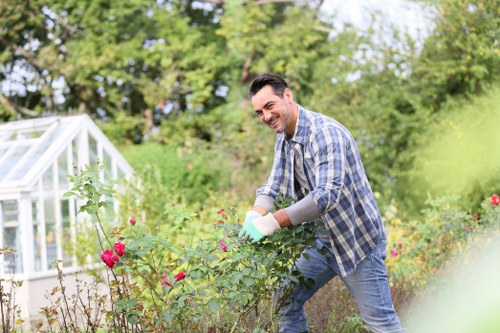
While DIY gardening can be rewarding, hiring professional landscape gardeners in Forest Hill offers numerous advantages. Professionals bring expertise, experience, and resources that can transform your vision into reality efficiently and effectively.
Expertise and Design Skills
Professional landscapers have the knowledge to create balanced and cohesive designs tailored to your specific needs and preferences. They stay updated on the latest trends, sustainable practices, and plant varieties, ensuring your garden remains contemporary and vibrant.
Project Management
Managing a landscape gardening project involves coordinating various elements such as plant selection, hardscaping, irrigation systems, and labor. Professionals handle all aspects, ensuring the project progresses smoothly and is completed on time.
Access to Quality Materials
Landscape gardening professionals have access to high-quality materials and plants, often at better prices than consumers can obtain. They can source the best materials that suit your garden's requirements and budget.
Maintenance Services
Beyond initial installation, professional landscapers offer maintenance services to keep your garden healthy and beautiful. Regular maintenance includes pruning, fertilizing, pest control, and seasonal adjustments to ensure your garden thrives year-round.
Cost-Effectiveness
While hiring professionals involves an upfront cost, it can be cost-effective in the long run by preventing costly mistakes and ensuring efficient use of resources. Skilled landscapers optimize plant placement and resource usage, reducing waste and enhancing the garden's longevity.
Investing in professional landscape gardening services in Forest Hill ensures a high-quality, sustainable, and aesthetically pleasing garden that enhances your property's value and your personal enjoyment.
Seasonal Tips for Maintaining Your Forest Hill Garden

Maintaining a vibrant and healthy garden in Forest Hill requires attention to seasonal changes. Here are some essential tips to keep your landscape garden thriving throughout the year:
Spring
Spring is a crucial time for garden preparation. Begin by cleaning up any debris from the winter months. Prune dead or damaged branches, and prepare the soil by adding compost or mulch. Plant spring-blooming flowers and trees, and set up an efficient irrigation system to support new growth.
Summer
During the summer, focus on watering and pest control. Ensure your plants receive adequate moisture, especially during dry spells. Mulching helps retain soil moisture and keep roots cool. Regularly inspect plants for signs of pests or diseases and address issues promptly.
Autumn
Autumn is the time to plan for the colder months. Plant autumn-blooming flowers, harvest any remaining vegetables, and prepare your garden beds for winter by adding a layer of mulch. Prune perennials and divide overcrowded plants to promote healthy growth in the spring.
Winter
In winter, protect your garden from frost and extreme temperatures. Cover sensitive plants with frost cloths, and ensure that drainage systems are clear to prevent waterlogging. Use this time to plan new garden projects and order plants and materials for the upcoming growing season.
Year-Round Care
Consistent care throughout the year, including regular weeding, pruning, and soil maintenance, ensures that your landscape garden remains healthy and attractive. Adapt your maintenance routines to address the specific needs of each season, and seek professional guidance when necessary to overcome challenges.
By following these seasonal tips, you can maintain a lush, vibrant garden in Forest Hill that provides beauty and enjoyment throughout the year.
Conclusion: Embrace the Beauty of Landscape Gardening in Forest Hill
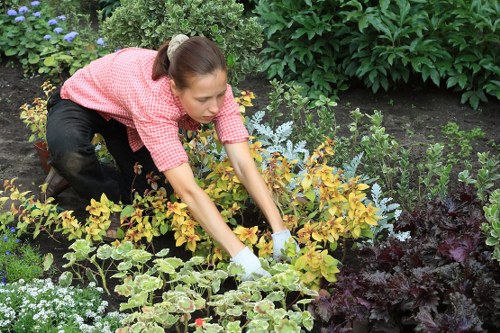
Landscape gardening in Forest Hill is a rewarding endeavor that enhances the beauty, functionality, and sustainability of your outdoor space. By thoughtfully planning your garden, selecting the right plants, incorporating essential hardscape elements, and adopting sustainable practices, you can create a stunning oasis that reflects your personal style and meets your lifestyle needs.
Whether you choose to undertake the project yourself or hire professional landscapers, investing in landscape gardening brings numerous benefits, from increased property value to improved personal well-being. Embrace the natural beauty of Forest Hill and transform your garden into a serene and inviting sanctuary.
Ready to elevate your outdoor space? Contact us today to schedule a consultation and begin your landscape gardening journey in Forest Hill. Let our experts help you design and create the garden of your dreams.
Frequently Asked Questions
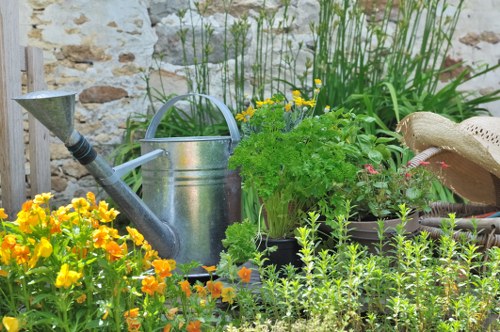
Here are some common questions about landscape gardening in Forest Hill:
1. How much does landscape gardening cost in Forest Hill?
The cost of landscape gardening in Forest Hill varies based on the size of the project, the materials used, and the complexity of the design. It is best to consult with a professional landscaper to receive a customized quote that fits your budget.
2. How long does it take to design and install a landscape garden?
The timeline for designing and installing a landscape garden depends on the project's scope. Typically, planning and design can take a few weeks, while installation may take several weeks to a few months. Factors such as weather, availability of materials, and project complexity influence the duration.
3. What maintenance is required for a landscape garden?
Ongoing maintenance includes regular watering, weeding, pruning, fertilizing, and pest control. Seasonal tasks such as mulching, planting, and preparing for winter are also essential to keep the garden healthy and vibrant.
4. Can I include edible plants in my landscape garden?
Yes, incorporating edible plants like vegetables, herbs, and fruit trees can add functionality and beauty to your landscape garden. It is important to choose varieties that thrive in Forest Hill's climate and soil conditions.
5. Are there eco-friendly options for landscape gardening?
Absolutely. Sustainable practices such as using native plants, efficient irrigation systems, composting, and integrated pest management contribute to eco-friendly landscape gardening. These methods promote environmental health and reduce the garden's ecological footprint.
Get Started Today
For more information or to begin your landscape gardening project in Forest Hill, don’t hesitate to reach out. Book your service now and take the first step towards creating a beautiful and sustainable outdoor space.